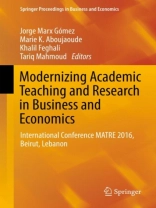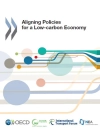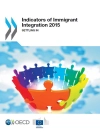This proceedings volume brings together the results of a corporate discussion on research, academic teaching and education in the field of business and economics in the context of globalization. The contributions examine leadership and sustainability, quality and governance and the internationalization of higher education. With a particular focus on business education and business schools, the book discusses the labor market and modernization as well as contemporary trends and challenges. By including both academic papers and contributions from industry, it forges research links between academia, business and industry.
Daftar Isi
Seeds of sustainability in Lebanese Universities: An empirical study.- Supply and demand for information system (IS) core knowledge in non-IS business occupations:
Fresh graduates’ and professionals’ perceptions.- Higher education and employability: building student’s self-confidence and efficacy.- Using data mining and business intelligence to develop decision support systems in Arabic higher education.- An Investigation of students’ social entrepreneurial intentions in Syria: an empirical test.- Review of leadership research in higher education.- The determinants of business students’ faculty performance: Evidence from a private university in Syria.- Adopting mobile business solutions in modernization of business education.- The impact of sustainable leadership on organizational trust: a private University in Syria empirical evidence from private higher education institutions in Syria.- The effect of good governance on higher education in Syria for the period (2000-2011).- University-Business Research Collaboration in Syria: An empirical assessment and suggested conceptual model.- Forging research links between academia, business and industry in Syria and Lebanon (industrial paper).
Tentang Penulis
Jorge Marx Gómez studied Computer Engineering and Industrial Engineering at the University of Applied Science in Berlin (Technische Fachhochschule Berlin, Germany). He was a lecturer and researcher at the Otto-von-Guericke-University Magdeburg where he also obtained a Ph D degree 2001 in Business Information Systems with a thesis on “Computer-based Approaches to Forecast Returns of Scrapped Products to Recycling”. From 2002 until 2003 he was a visiting professor for Business Informatics at the Technical University of Clausthal (Technische Universität Clausthal, Germany) and worked as lecturer in different countries. In 2004 he received his postdoctoral lecture qualification (Habilitation) for his work on “Automated Environmental Reporting through Material Flow Networks” at the Otto-von-Guericke-University Magdeburg. In April 2005 he received the research price of the faculty of computer science at the Otto-von-Guericke-University Magdeburg. Since 2006 Jorge Marx Gómez is a full professor and chair of Business Information Systems / Very Large Business Applications (VLBA) at the Carl von Ossietzky University of Oldenburg.His research interests include Business Information Systems, Federated ERP-Systems, Business Intelligence, Big Data, Interoperability, Environmental Management Information Systems and e- and Mobile-Commerce.
Marie Karim Aboujaoude earned a Ph D in Management Information Systems from Kennedy Western University USA with a dissertation on “Data Quality Control in Information Systems for Health Organizations”. She has over 15 years of academic teaching in Information Systems engineering, development, integration and management, and over 20 years as Senior Advisor, Director of R&D department and Leader in Information Systems Modeling and Business Intelligence. She managed & monitored the fulfillment of multiple Information Systems projects in an international and multicultural environment, specialized in Health care, Retail, e-commerce /GDSN- Global Data Synchronization Network and extended ERP systems. Dr. Marie Aboujaoude was a part-time lecturer at Lebanese University – Faculty of Economics & Business Administration from 2002 to 2008 and at ISAE CNAM (Conservatoire National Des Arts & Métiers), France/Lebanon from 2006 to 2007 and a full-time senior lecturer at Lebanese University from 2008 to- date. She was head of Business Information Systems department at Lebanese University, Faculty of Economics & Business Administration Section 2, from 2009 to 2012. Her research interests include Complex System Theory, Business Intelligence, Knowledge Engineering & Ontology development and e-/ m-commerce.
Khalil Feghali earned his Ph D in Business Administration from Bordeaux IV France and his Master Research in Business Administration from Bordeaux I, France. Professor Feghali is at present the dean of Economics and Business Administration Faculty. He joined the Lebanese University, Faculty of Economics and Business Administration Section II at 1997 as Lecturer, and since 2005, he is the head of Accounting and Audit department and he is responsible for the Master Research in Business Administration French section. Professor Feghali is a member of the Lebanese University Council since 2014. From 1998 to 2004, he was a Financial and Administrative Director of Sleep Comfort Group Lebanon and occupied the position of Management Controller from 1992 to 1996 at SODETAL Production S.A.R.L. and from 1990 to 1992 at CLEAL France. Tariq Mahmoud studied Information Engineering at Al-Baath University in Homs, Syria. He had then completed his doctoral degree 2013 in Informatics at Carl von Ossietzky University of Oldenburg (Germany). From 2007 until 2016 he was a research fellow at the working group of Business Informatics at the Carl von Ossietzky University of Oldenburg (Germany). From 2011 until 2016 he coordinated several international projects at Carl von Ossietzky University of Oldenburg. His research interests include Semantic Enterprise Service-Oriented Architecture, Information Security, Business Intelligence, Business Information Systems, Enterprise Systems Engineering, Data Warehousing, Big Data and Semantic Web. His skills and experience include teaching, curriculum development and course building in addition to ability to deal with technology-enhanced methods of teaching.












